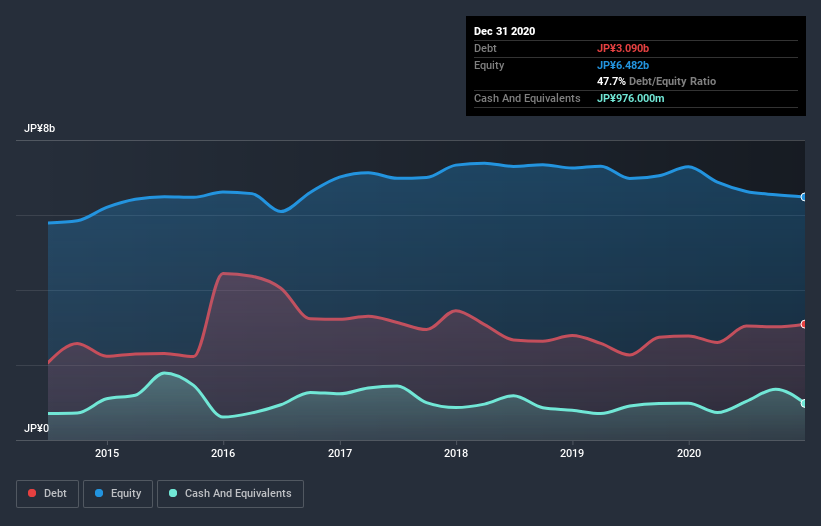Warren Buffett famously said, 'Volatility is far from synonymous with risk.' It's only natural to consider a company's balance sheet when you examine how risky it is, since debt is often involved when a business collapses. As with many other companies T.Kawabe & Co., Ltd. (TYO:8123) makes use of debt. But should shareholders be worried about its use of debt?
When Is Debt Dangerous?
Debt and other liabilities become risky for a business when it cannot easily fulfill those obligations, either with free cash flow or by raising capital at an attractive price. Part and parcel of capitalism is the process of 'creative destruction' where failed businesses are mercilessly liquidated by their bankers. However, a more frequent (but still costly) occurrence is where a company must issue shares at bargain-basement prices, permanently diluting shareholders, just to shore up its balance sheet. Of course, debt can be an important tool in businesses, particularly capital heavy businesses. The first step when considering a company's debt levels is to consider its cash and debt together.
View our latest analysis for T.Kawabe
What Is T.Kawabe's Net Debt?
You can click the graphic below for the historical numbers, but it shows that as of December 2020 T.Kawabe had JP¥3.09b of debt, an increase on JP¥2.78b, over one year. However, because it has a cash reserve of JP¥976.0m, its net debt is less, at about JP¥2.11b.

How Healthy Is T.Kawabe's Balance Sheet?
According to the last reported balance sheet, T.Kawabe had liabilities of JP¥5.10b due within 12 months, and liabilities of JP¥1.26b due beyond 12 months. On the other hand, it had cash of JP¥976.0m and JP¥2.08b worth of receivables due within a year. So its liabilities total JP¥3.30b more than the combination of its cash and short-term receivables.
This deficit casts a shadow over the JP¥1.93b company, like a colossus towering over mere mortals. So we'd watch its balance sheet closely, without a doubt. After all, T.Kawabe would likely require a major re-capitalisation if it had to pay its creditors today. The balance sheet is clearly the area to focus on when you are analysing debt. But it is T.Kawabe's earnings that will influence how the balance sheet holds up in the future. So if you're keen to discover more about its earnings, it might be worth checking out this graph of its long term earnings trend.
Over 12 months, T.Kawabe made a loss at the EBIT level, and saw its revenue drop to JP¥12b, which is a fall of 25%. That makes us nervous, to say the least.
Caveat Emptor
Not only did T.Kawabe's revenue slip over the last twelve months, but it also produced negative earnings before interest and tax (EBIT). Indeed, it lost a very considerable JP¥369m at the EBIT level. Considering that alongside the liabilities mentioned above make us nervous about the company. We'd want to see some strong near-term improvements before getting too interested in the stock. Not least because it had negative free cash flow of JP¥535m over the last twelve months. So suffice it to say we consider the stock to be risky. The balance sheet is clearly the area to focus on when you are analysing debt. But ultimately, every company can contain risks that exist outside of the balance sheet. We've identified 4 warning signs with T.Kawabe (at least 2 which shouldn't be ignored) , and understanding them should be part of your investment process.
If, after all that, you're more interested in a fast growing company with a rock-solid balance sheet, then check out our list of net cash growth stocks without delay.
When trading T.Kawabe or any other investment, use the platform considered by many to be the Professional's Gateway to the Worlds Market, Interactive Brokers. You get the lowest-cost* trading on stocks, options, futures, forex, bonds and funds worldwide from a single integrated account. Promoted
Valuation is complex, but we're here to simplify it.
Discover if T.Kawabe might be undervalued or overvalued with our detailed analysis, featuring fair value estimates, potential risks, dividends, insider trades, and its financial condition.
Access Free AnalysisThis article by Simply Wall St is general in nature. It does not constitute a recommendation to buy or sell any stock, and does not take account of your objectives, or your financial situation. We aim to bring you long-term focused analysis driven by fundamental data. Note that our analysis may not factor in the latest price-sensitive company announcements or qualitative material. Simply Wall St has no position in any stocks mentioned.
*Interactive Brokers Rated Lowest Cost Broker by StockBrokers.com Annual Online Review 2020
Have feedback on this article? Concerned about the content? Get in touch with us directly. Alternatively, email editorial-team (at) simplywallst.com.
About TSE:8123
T.Kawabe
Manufactures, sells, imports, and exports handkerchiefs, scarves, mufflers, towels, and fabric products in Japan.
Solid track record with excellent balance sheet and pays a dividend.
Market Insights
Community Narratives



